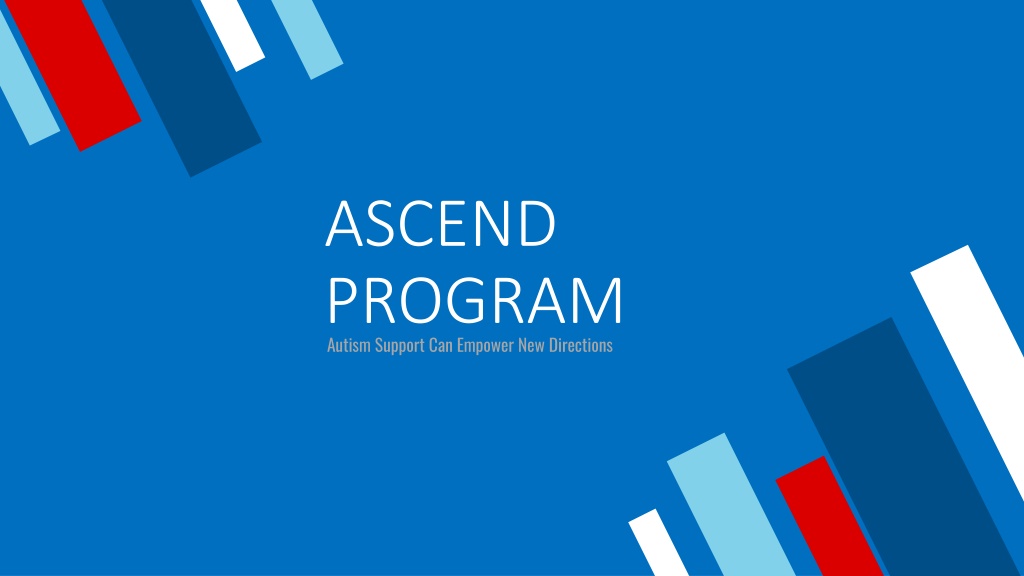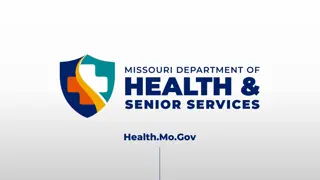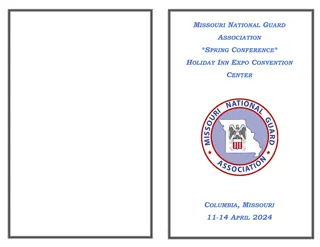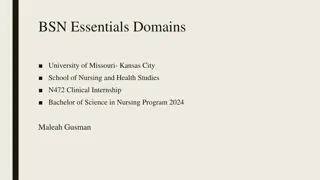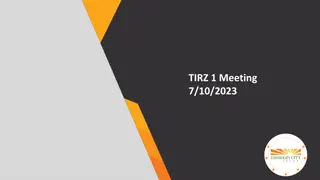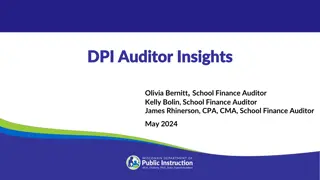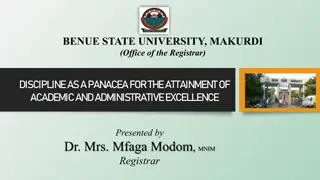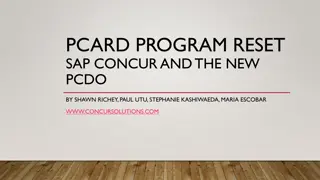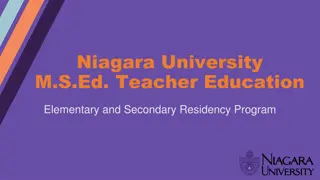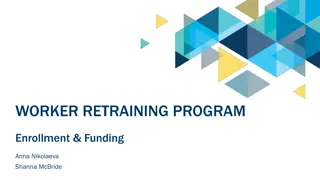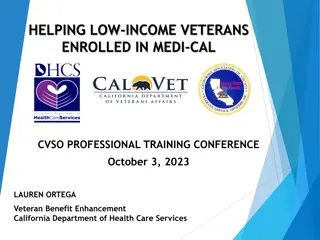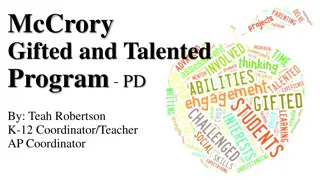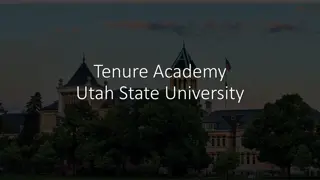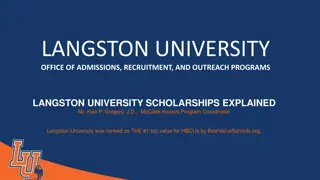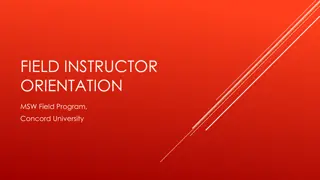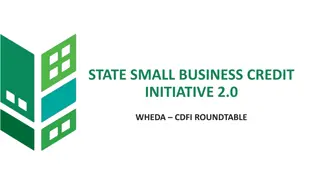ASCEND PROGRAM at Missouri State University-West Plains
The ASCEND Program at Missouri State University-West Plains provides comprehensive support for college students with autism, focusing on academic, executive function, social strategy, and daily living skills. Through personalized services and structured activities, students are empowered to navigate college life successfully, promote self-confidence, and foster independence.
Download Presentation
Please find below an Image/Link to download the presentation.
The content on the website is provided AS IS for your information and personal use only. It may not be sold, licensed, or shared on other websites without obtaining consent from the author. Download presentation by click this link. If you encounter any issues during the download, it is possible that the publisher has removed the file from their server.
Presentation Transcript
ASCEND PROGRAM Autism Support Can Empower New Directions
What is the ASCEND PROGRAM? Our Mission Our Mission To encourage and foster self-confidence, self-advocacy, and growing independence in college students with autism; To understand students strengths and weaknesses and help them learn and apply skills and strategies to successfully navigate the communication, planning and problem-solving demands of college life. Transition to college Transition to college The ASCEND Program at Missouri State University-West Plains seeks to provide additional support in comparison to the reasonable accommodation in the higher education setting. Students in ASCEND receive service in four main areas: academic supports, executive functions development, social strategy supports, and daily living transitions. The program is mindful of skills needed as students transition to college life and general education coursework as well as later transitions.
Degrees & Certificates Associate of Arts Associate of Arts Criminology Child and Family Development General Studies Health Professions Teaching Associate of Science Associate of Science Agriculture (Options: Agricultural Business, Agriculture Education, Natural Resources, Plant Science, Animal Science, General Agriculture, Wildlife Management) Business Nursing Pre-Engineering Technology Associate of Applied Science Associate of Applied Science Agriculture Business Child and Family Development Computer Graphics and Programming Culinary and Hospitality Management Enology Entrepreneurship General Agriculture Health Information Technology Law Enforcement Technology Viticulture Wine Business and Entrepreneurship
PROGRAM STRUCTURE Students in ASCEND receive service in the areas of: academic supports, social strategy supports, and daily living transitions. The program is mindful of skills needed as students transition to college life and general education coursework as well as later transitions for advanced coursework in their major and career planning. To directly address executive function, academic, social, and daily living skills, ASEND will provide the following: Early move-in for a calmer transition Personalized campus tour Meet university faculty Weekly one-on-one meetings with Support Coordinator: Customized for student s needs Create and achieve goals Academic and Problem-solving guidance Encourage self-advocacy Foster positive self-esteem Weekly ASCEND class: Workforce Readiness Executive Functions Social perspective/Situational awareness skills Weekly meeting/social event with ASCEND Allies Internships starting their second year Access to breakroom: Sensory tools for calming and recentering. Crash pad, massage chair, and swing. Quiet study space with wi-fi and computers. Alternative seating options
Tuition & Fees A fee of $3,000 is required to participate in the ASCEND Program each semester in addition to regular tuition, fees, books, and room and board. This fee is put into place to ensure the needed materials and team members are available. When students have demonstrated success at MSU-WP and less support and skill building is needed, they can move from ASCEND to ASCEND-M (matintenance), which is $1,500 per semester. The fee will be assessed to your student account. ASCEND follows MSU-WP policies in regard to tuition and fees. Financial aid and scholarship information can be found at: https://wp.missouristate.edu/finaid/
Potential First Day Conversation Topics: Where are you from? What s your major? What dorm are you in? Have you gotten books/supplies for whatever class you are in? What other classes are you taking? Have you heard anything about this class? Easy/hard/lots of work/professor? First day of Class What to expect The people sitting around you will likely be engaging in small talk, you may choose to participate or not, but if addressed directly, it is best to respond. (May need to whisper if super quiet room.) Class may not take the whole scheduled time. It is likely your professor will simply go over the syllabus, and outline course/classroom expectations. You may have to participate in an icebreaker activity, you may be assigned a partner or a group for that course. Classmates may ask for contact information on this day as well. Do s and Don ts Do get your materials ready as soon as you sit down. Do no interrupt the professor. Wait until he/she asks for questions to speak. Do write down you questions as the professor will likely have time at the end for questions. Do wait for the professor to officially end class before leaving Do introduce yourself to your professor after class and disclose your diagnosis as you feel comfortable or ensure your professor received your letter of accommodations. Don t ask more than three questions if you have more questions, email or wait to talk with the professor after class or during his /her office hours.
Differences Between High School and College For Students with Disabilities High School College Students are responsible for all aspects of identifying their needs, seeking help and monitoring the effectiveness of their accommodations. School must guarantee equal access, but academic success is up to the student. Students are responsible for obtaining and providing the results of testing that documents their disabilities (documentation) Schools must guarantee the academic success of the student with disabilities. In high school, students have little or no responsibility for identifying their needs and seeking help Schools provide testing for disabilities Who is responsible Academic services determined yearly by IEP (a plan made by parents, professionals, and teachers) Parent, professionals and teachers determine when services aren t effective, and make adjustments Teachers and other professionals typically provide services in the classroom setting School specialist and parents inform teachers of specific services or adjustments Academic services determined each semester by a meeting between student and a ODS representative Student must decide if their accommodations are effective and if not, must contact the Office of Disability Services to discuss concerns Services may be provided at various campus locations After meeting with an ODS representative and agreeing upon accommodations, students must communicate and arrange their accommodations directly with their instructors Services
Differences Between High School and College For Students with Disabilities High School College Teachers monitor and follow up on classroom absences School schedules student classes back-to-back during regular school hours Class size usually is under 35 Extracurricular participation dependent upon academic performance Students must know and follow each instructor s absence policy or pay the consequences Students may choose to schedule classes at a variety of times throughout the day and evening A variety of class sizes, some much larger than 35 Extracurricular participation not contingent upon grades Classes Students are responsible for their own academic success Instructors rarely monitor homework (rarely counts in grading) Students must recognize when they need additional help and find the resources that provide that assistance Students must read and follow the deadlines established by the syllabus (extensions on deadlines are rare) Students must self identify their disabilities directly with their instructors, provide the instructors disability verification information from an ODS representative, and work with each instructor to make accommodations arrangements Teacher are responsible for students academic success Teachers monitor homework (a big part of grades) Teachers are responsible for identifying and working with students in academic difficulty Teachers give assignments daily, offer frequent reminders, and often permit students extra time to complete their work School personnel and parents alert teachers to students with disabilities in their classrooms and how to work with them Role of Instructors Grades may be based on many homework, tests, quizzes, papers and extra credit projects Teachers may use any class work or effort to determine final grade and may use different criteria for different students Grades generally based upon a few exams or papers with little to no extra credit Instructors syllabi establish how grades will be assigned, including how each test, paper, etc. will count toward the final grade (in most cases, students with disabilities are graded on the same pre- determined scale) Grading Used with permission from Marquette University Office of Disability Services
Things to work on For HOUSING Conversation Starters: My name is Where are you from? What do you like to do in your free time? What your favorite movie? What s your major? Follow up statements: How long have you lived there? That s awesome! I like to My favorite movie is My major is
Things to Process and practice Self Advocate Know what your accommodations are prior to class starting. Ask for a meeting with your professor. Explain what accommodations you have. Know your strengths and weaknesses. See what needs you have and ask for help. Don t assume things will be changed on their own. Be proactive! Conflict Resolution Compromise A compromise is a way for both people to get a little bit of what they want. Sometimes we have to give a little as well. Listen to what the other person is saying. Do not demand that only your voice be heard. Wait to talk until your emotions have calmed down. Do not avoid the conversation. Take responsibility for your actions.
Things to Process and practice Student Etiquette Do not barge in yelling, I m here. or abruptly leave class before dismissed Wait your turn to talk. Do not interrupt the professor. Reciprocate questions: I m well. How are you? Arrive to class on time. Problem Solving Identify the problem. What do you think happened & what does the other person think happened? What could I do to fix the problem? (Think of 3 solutions) What might happen if I try the solutions? What solution is best? Try it! IF it fails try another solution that you thought of. What did you learn from it?
Thank you Website: https://wp.missouristate.edu/ASCEND/ Facebook: https://www.facebook.com/WP.ASCEND
